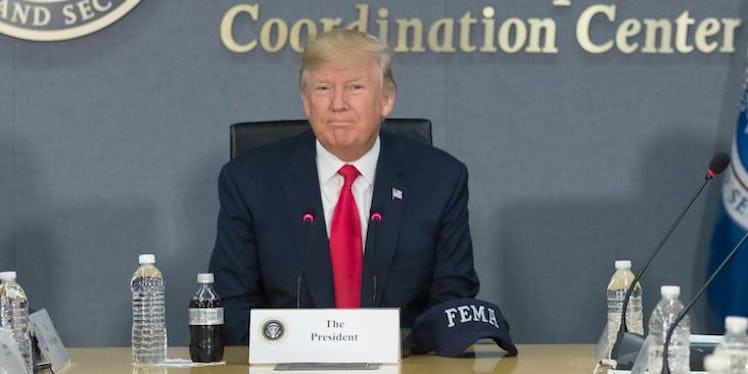
Trump’s “Fire And Fury” Threat To North Korea Was Improvised And No One is Surprised
We live in a big, convoluted world and not every president enters the White House with a deep knowledge of foreign policy. This is why most presidents have consulted advisers or experts as they attempt to figure out how to best respond to crises across the globe. But President Donald Trump apparently prefers to wing it. According to Peter Baker and Glenn Thrush of The New York Times, Trump's North Korea threat was improvised on Tuesday, Aug. 8, as he responded to news the often aggressive nation had developed nuclear-capable missiles that could potentially reach mainland U.S. cities.
When questioned about these developments in New Jersey on Aug. 8, Trump said, “North Korea best not make any more threats to the United States. They will be met with fire and the fury like the world has never seen.” This was widely viewed as a threat of nuclear war, which, quite understandably, alarmed people both in the U.S. and across the world.
According to The Times, Trump's incendiary remarks toward North Korea were unplanned and caught his aides completely off guard, including White House Chief of Staff John Kelly. Kelly only recently took over this position from Reince Priebus and there were hopes he would help reign in Trump's often erratic behavior and bring some calm to his administration. But, at least in terms of Trump's reaction to North Korea, Kelly appears to have failed.
People took to Twitter to express their lack of shock that Trump's threat to North Korea was off the cuff.
Why does this matter?
The U.S. and North Korea have been enemies for decades -- since the end of the Korean War in 1953 -- and their relationship is frequently characterized as one of the most complex matters in global affairs.
Foreign policy experts tend to urge presidents against using bombastic language when responding to North Korean posturing to avoid being drawn into a dangerous, potentially catastrophic conflict. Trump arguably did the opposite. In fact, some said Trump's language was similar to rhetoric employed by North Korean leaders. This doesn't mean the U.S. is definitely on its way to war with North Korea, but Trump's rhetoric on Tuesday, Aug. 8, certainly heightened tensions in a major way.
While North Korea's ability to strike targets in the U.S. is still questionable, it's a volatile nation with nuclear weapons that's easily provoked. Not only that, it's already more than capable of striking targets in Japan and South Korea, which are key U.S. allies in the region.
Moreover, any conflict with North Korea would likely draw in China in some way or another. China is North Korea's largest trading partner and sees it as a buffer against U.S. interests in the region. While China has at times agreed to help the U.S. reign North Korea in, even recently, it's unlikely it would be supportive of regime change. Therefore, an armed conflict between the U.S. and North Korea would almost unquestionably involve many other players and lead to an unthinkable level of destruction. It's not something anyone should wish for.
Along these lines, you would hope whoever is in the White House would proceed with caution when responding to North Korean threats. Along these lines, you would also hope a president would seek counsel from those who think about these situations non-stop, such as the secretary of state or National Security Council. Trump didn't do this whatsoever. As a result, U.S. allies are gravely concerned and North Korea has threatened to bomb the U.S. territory of Guam.
One of the first lessons children are taught is to think before they speak. It seems Trump either never heard this or chose to ignore it.